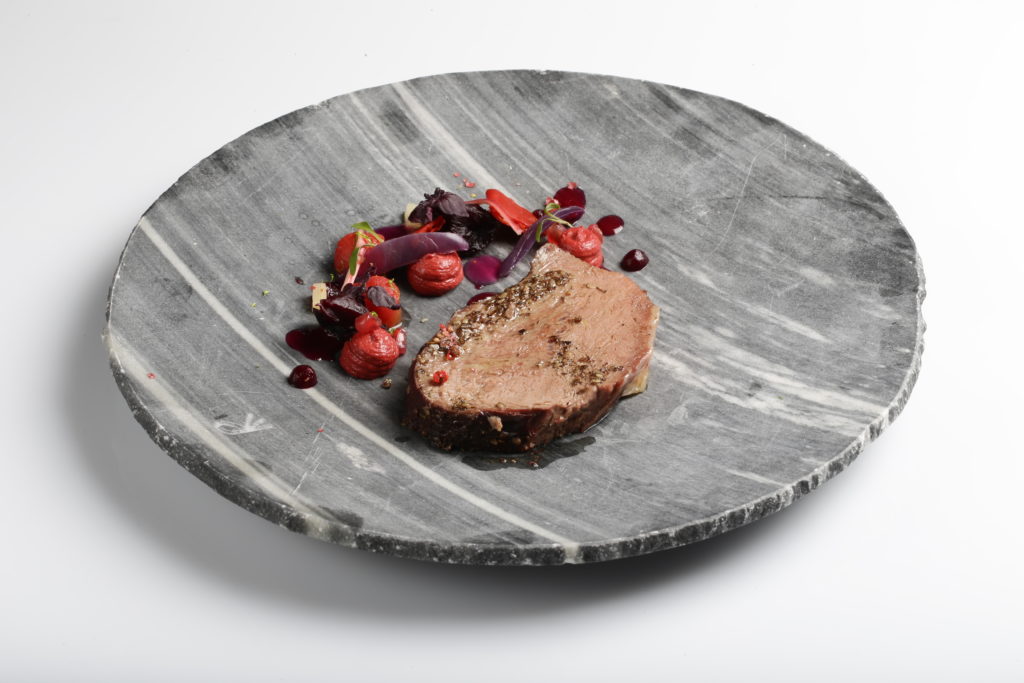In the years since one of the pillars of Spanish gastronomy and the El Celler de Can Roca trinity has paved the way for sous-vide cuisine into the mainstream, Joan Roca still spends much of his time in his kitchen playing with and researching about all the possibilities that low-temperature cooking has to offer.
At Madrid Fusión 2019, Roca presented innovations that don’t just uplift his creative ambitions for low-temperature cooking—techniques like “dry steam under pressure at low temperature, maturation in a cabinet plus brine injection and grilling, and cooking in the smoke oven”—but also how the art of sous-vide is making serious inroads in sustainability.
So what’s on the mind of this research-driven chef? Recycling. That is, reusing the plastic from the vacuum bags utilized in sous-vide and collaborating with designer Andreu Carulla to turn them into aprons. In essence, each step in Roca’s process contributes something in the food chain—whether creating beautiful low-cooked cuisine, generating livelihood for low-income families, or simply instilling a greater awareness for recycling.
Where does this passion for sous-vide cooking come from?
This passion comes from cooking food slowly as my grandmother used to do. The aim [with slow cooking] is to do this but in a very technical and precise way.
Have you been developing new techniques and innovations in your kitchen?
Now [we’re looking at] cooking in low temperature but without sous-vide.
So what’s on the mind of the research-driven Joan Roca? Recycling. That is, reusing the plastic from the vacuum bags utilized in sous-vide.
So there’s a growing concern about the food industry’s use of plastic. Is that new thing you are exploring going to make slow cooking more sustainable because you can eliminate plastic in the equation?
We’re going to use fewer bags with this technique and the bags that we do need to use, we started a program so that we can recycle them and turn them into aprons we can sell in the restaurant.
Is it already available?
It’s not available yet. It’s a very new project, just two weeks old. But the aim is to give jobs to people who maybe come from low-income families and also to make people aware of the need to recycle plastic.

It seems like chefs these days are embracing roles that are more than just confined in the kitchen. Do you think that it’s going to continue moving forward?
There’s a lot of public attention on chefs and it’s only natural that when society looks at you, you feel the need to do something to make people aware of these issues and projects.
You’ve done a lot of culinary research but how does that relate to innovation in gastronomy?
I think this kind of research comes from being a non-conformist to things that are already established so it’s mainly looking at creativity but also to help with projects; for example what we were talking about with sustainability.
“The main point is to be authentic and make your customers happy so each person, in order to find their own voice and identity, they need to be able to tell which trend is going to help them out with that. It’s more of a personal thing,” says Joan Roca about trends.
Are there trends that are a big waste of time?
The main point is to be authentic and make your customers happy so each person in order to find their own voice and identity they need to be able to tell which trend is going to help them out with that. It’s more of a personal thing.
So do you follow or create trends?
Up until now I think I’ve been into creating trends and always trying to innovate more than following.
Do you think Michelin stars and awards are important to a chef?
Of course chefs don’t go into cooking for awards and Michelin stars. We do it because we are in love with our job and because we want to make people happy with food. But they are a good way to get visibility and to get our work to be known. That always has a positive impact in the economy where the restaurant is.